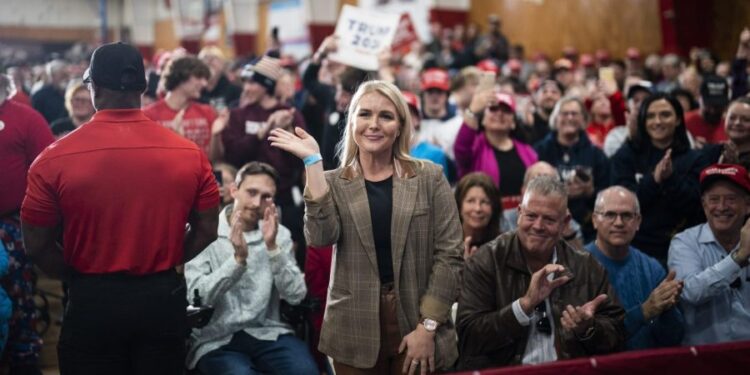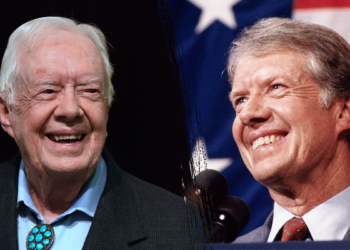
Karoline Leavitt is weeks away from stepping into her highest-profile position: press secretary for President Trump’s White House.
Leavitt, 27, will be the youngest person to ever hold the position. Ron Ziegler, who worked as President Nixon’s press secretary, was 29 when he was hired.
The New Hampshire-born Leavitt has become a trusted messenger for Trump who served as the chief spokesperson for his campaign.
In that role, she seemed to relish opportunities to spar with members of the media, something Trump likely admired.
In network interviews, she has backed some of the former president’s most controversial claims and often blasted journalists and news outlets for covering Trump unfairly.
Many saw her as an obvious choice as press secretary for Trump, who places major stake in personal chemistry behind the scenes with his aides and weighs heavily their ability to defend him convincingly on television.
“This is an extremely personal choice for Donald Trump,” Sean Spicer, who served as Trump’s first White House press secretary, told The Hill.
“He knows the importance of that role, and Karoline has earned his trust on that,” said Spicer, who is also a contributor to NewsNation, The Hill’s sister network.
Experience with the logistics of the White House press office and the bond she forged with Trump along the campaign trail are the two qualities that likely put Leavitt over the top, Spicer said.
“She had the relationship nobody else did,” he said.
Before joining Trump’s 2024 campaign as a spokesperson, Leavitt worked as a top aide to Rep. Elise Stefanik (R-N.Y.) and ran an unsuccessful campaign for Congress in New Hampshire’s 1st District, though she won a contested GOP primary.
She comes with West Wing bona fides, having worked as an assistant press secretary under Kayleigh McEnany at the end of Trump’s first term.
McEnany, now a Fox News host, spoke glowingly of Leavitt as she ran for Congress, calling her a “rock solid conservative” and skilled public speaker as she backed her former assistant’s candidacy.
Being press secretary for the White House is one of the most difficult jobs in communications, and working in that capacity for Trump may only make it harder.
Trump wants the people who speak for him on television to be able to do so strongly, and he can be their greatest critic. He likely watches the briefings more than the average modern-day president. In his first term, McEnany was just one of four press secretaries for Trump, along with Spicer, Stephanie Grisham and Sarah Huckabee Sanders.
On the second day of Trump’s first presidency, Spicer was tasked with defending Trump’s claims that the crowds that came to see his inauguration were the biggest in history. Disagreeing with that claim from Trump was not really an option.
Spicer has said in media interviews since leaving the White House that Trump made it clear he was not pleased with his first performance at the podium.
“In all honesty, I wasn’t prepared the first time I went out to give a briefing in the way that I was on the subsequent Monday,” he told The Hill.
Four years later, McEnany served as Trump’s top spokesperson as he was floating unfounded theories about treatment for the coronavirus pandemic.
Days after Trump was mocked for musing about the possibility of light or disinfectant being used to treat patients with the coronavirus, she issued a blistering statement blaming the media for “irresponsibly taking President Trump out of context and running with negative headlines.”
Come January, White House press briefings are expected to garner widespread television coverage once again, and Leavitt will be asked to react in real time to developing news events as she takes her turn in the spotlight.
Some in the Washington press corps have told The Hill in recent weeks Trump’s selection of Leavitt telegraphs a doubling down on the more combative rhetoric with the press that came to define Trump’s first term.
The president-elect is currently suing several mainstream media outlets and journalists, though he has offered to be more “open and available” to members of the media during a second term.
Leavitt, meanwhile, turned heads with comments on Sean Hannity’s Fox News program about how she plans to deal with the media.
She, like others in Trump’s orbit, has teased a shake up the seating chart and operating procedures of the James S. Brady briefing room that could deemphasize the prominence of mainstream news outlets.
“We hope there will be decorum, certainly, and we will try to instill that,” she said during the Fox appearance with Hannity. “But we’re not shy of the hostile media.”
Others who have worked for Trump say Leavitt’s job will be an especially difficult one given the incoming president’s unpredictable and free-wheeling style as he deals with the press.
Trump, these people say, will always see himself as his own best media messenger.
“You don’t manage Donald Trump’s personality, but to know what to expect is important,” said Mick Mulvaney, a former White House chief of staff who is now a contributor to NewsNation.
“Folks don’t last forever; it’s not a job that lasts four years. The question is can she effectively articulate the president’s agenda. I think she’s already proven she can do that.”







